Wales ambulance: Strike action 'seriously disrupts' service
- Published
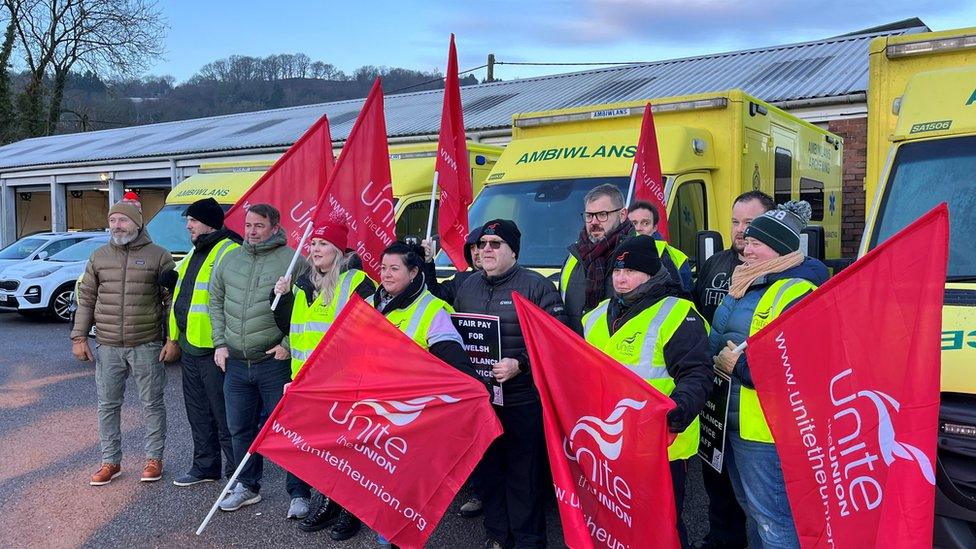
The Unite union's general secretary said the Welsh government's one-off payment offer was not enough
More than 1,000 striking ambulance staff have left the service "seriously disrupted", bosses say.
Thursday is the first day of action by the Unite union over pay and conditions and follows two days of GMB walkouts.
Unite wants a cost of living salary rise and said a Welsh government offer of a one-off payment would not stop strike action.
Health minister Eluned Morgan said "the clock is ticking" on the time the unions have to accept that offer.
Welsh Ambulance Service assistant operations director, Sonia Thompson, said: "The strike has seriously disrupted the service today.
"It's not a situation that we like to be in, and it's not an ideal situation, but we do have resources available to respond to people where their lives are at risk."
She said the day had been "quite difficult" adding that management respected the right of staff to strike.
It comes as new figures show the Welsh Ambulance Service received a record number of calls in December, with response times at a record low.
Allow X content?
This article contains content provided by X. We ask for your permission before anything is loaded, as they may be using cookies and other technologies. You may want to read X’s cookie policy, external and privacy policy, external before accepting. To view this content choose ‘accept and continue’.

Ministers have said they understood workers' frustrations and called on people to minimise pressure on the NHS.
Unite, which represents about a quarter of Wales' ambulance workers, said it will provide so-called "life and limb" emergency care but wants talks to move faster.
Among those on the picket lines was paramedic and Love Island star Paige Thorne, who joined colleagues striking in Swansea.
Explaining the action to her one-and-a-half million Instagram followers, she said strikes were a "last resort" but that it was "beyond words" that NHS workers were struggling to pay for food and fuel.
"We have agreed, and always will agree, on providing the top tier, highest priority call, life-threatening cover," she said.
"We do not want anyone to come to harm from the disruption in service, but we have been pushed to this as a last resort to get the government to understand that staff are facing such financial crisis."
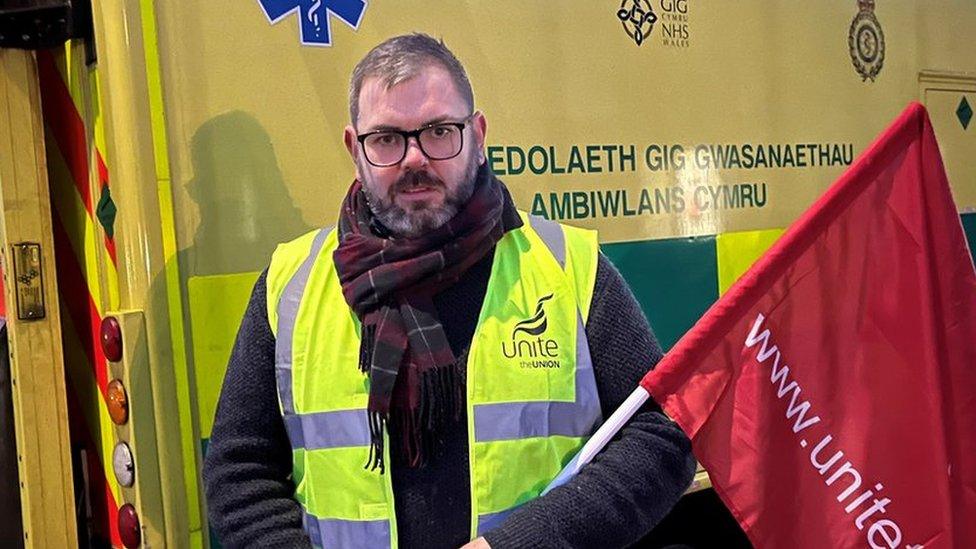
Tace Richards, a striking paramedic on a picket line in Hawthorn, Pontypridd, says staff are at breaking point
Tace Richards, a paramedic on the picket line in Pontypridd, Rhondda Cynon Taf, said: "We want to do our best, we've worked through the pandemic, we've had all the claps on a Thursday night. [But] they do not put food on the table for our children and families".
He said more money would encourage more staff to come back to the NHS, meaning better conditions for patients.
"Westminster needs to sort this issue out, the fact they are completely refusing to talk with us, they would rather pass legislation to stop us striking," he said.
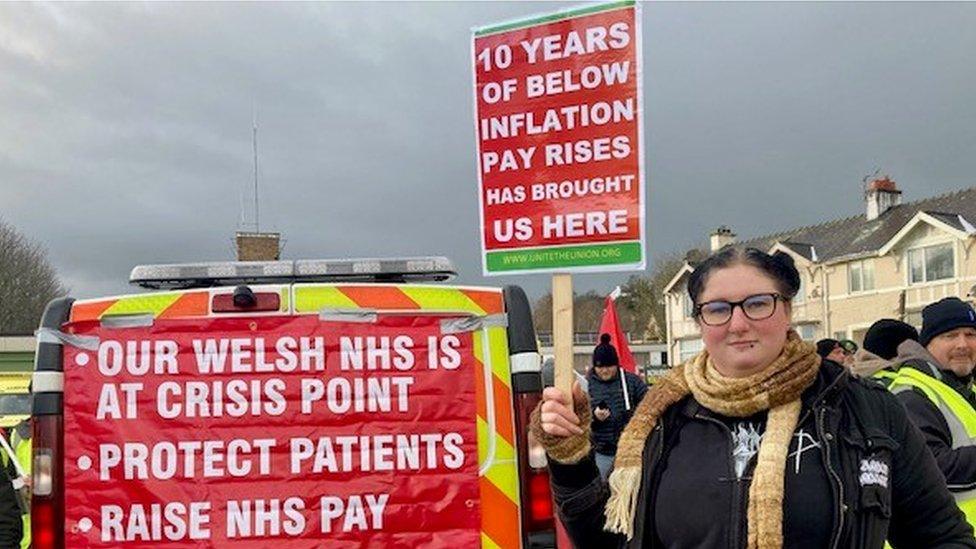
Catherine Sutton said pressures on the NHS were "just too much"
Catherine Sutton, a dispatch assistant on the picket line in Bangor, said she was striking because change is needed.
She said: "We've had a real terms pay cut for the last two years, people are struggling, the pressures the NHS are under... it's just too much.
"There's people leaving the service in droves. We need to up the incentives for the staff to stay."
Addressing people's concern's about patient safety during the strikes, Ms Sutton emphasised that this was an issue outside of the strikes as well and was one of the main reasons she was out on the picket line.
"You go into work and you've got sixty to seventy people waiting for an ambulance and no one to send, so that's why we're here."
Unite general secretary Sharon Graham said NHS staffing problems were making her members' jobs increasingly difficult.
She said: "They see first-hand how our NHS is collapsing. A decent consolidated pay increase is the only way to improve NHS recruitment and relieve the crippling pressure on our ambulance services.
"The recent proposal from the Welsh government of a one-off payment simply does not cut it."
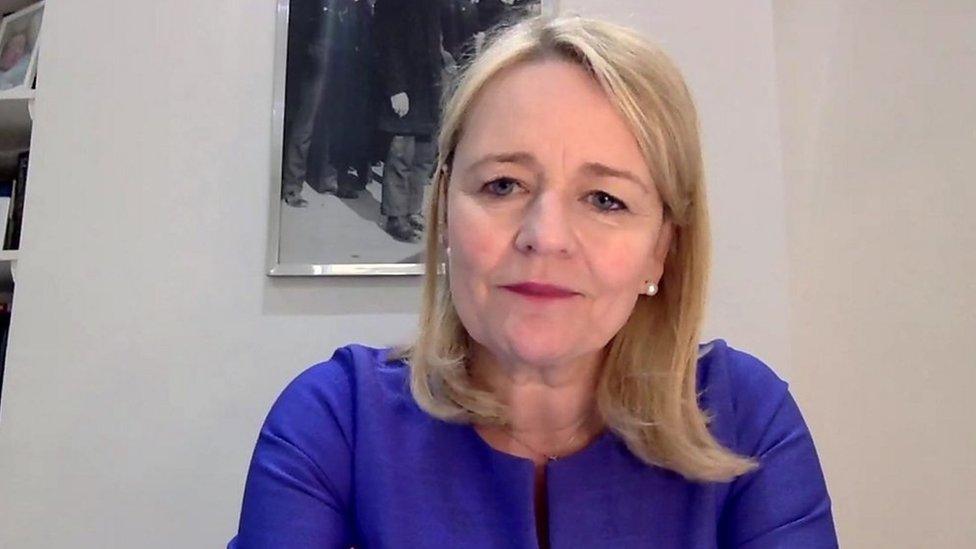
Unite general secretary Sharon Graham said NHS staffing problems were making her members' jobs difficult
She said the only way to prevent further strikes was for the Welsh government to offer a cost of living salary increase.
Zoe Codd, regional officer for Unite the Union, said from the picket line at Glangwili Hospital, Carmarthen: "I think speaking to the members today, it's very clear that they are frustrated at the fact they spend most of their shift outside A&E departments.
"They know the number of calls coming in from patients in our communities that need help, but they're stuck outside the hospitals because they've got patients that can't get into A&E.
"That's not acceptable, that's not their job. Their job is to be supporting patients so we need to really fix that issue and be providing the care to people in communities that really need it."
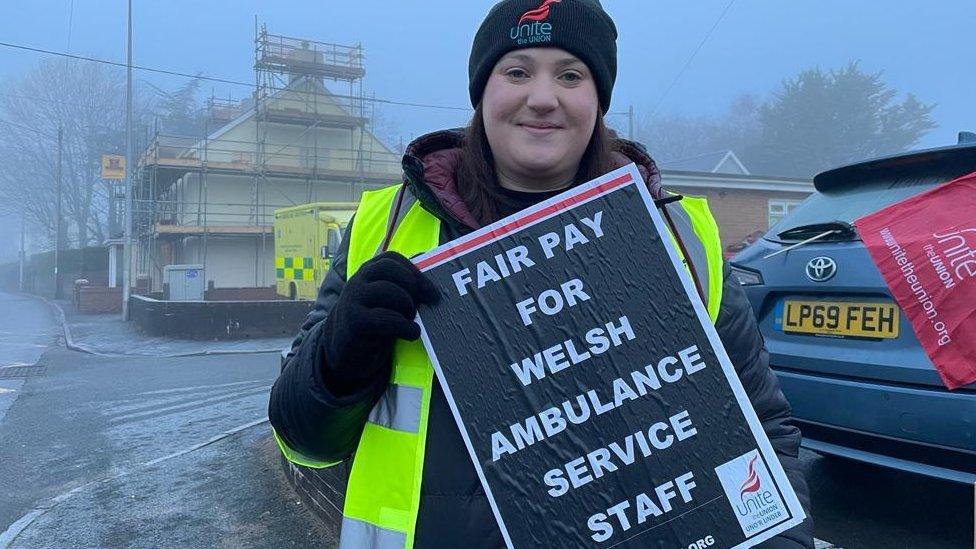
Zoe Codd, regional officer for Unite in Carmarthen, said that ambulance staff are frustrated at having to spend most of their shifts outside A&E
Speaking to BBC Radio Wales, chief executive of the Welsh Ambulance Service Jason Killens, said staff had described "a deep conflict in the choices they are making".
"On the one hand - like me - I joined the ambulance service to help people and provide great care to patients when they need it most.
"Yet when I've been speaking to colleagues, they say they feel so strongly that they can't do that on a day to day basis because of the pressure, that they feel they need to take action," he said.
Unite has a second 24-hour strike planned for Monday, 23 January.
Ambulance crews, control-room staff and others in Wales are picketing, and next week colleagues in England will also take action.
Pressure is increasing on the Welsh and UK governments, with NHS unions planning to take further action next month.
The GMB has unveiled fresh strikes in February and March.
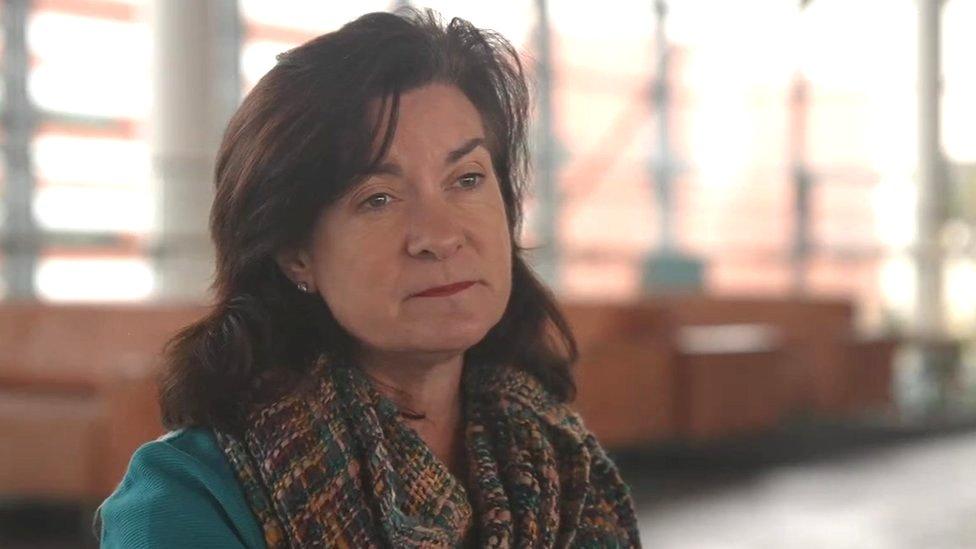
"We have put a package of measures on the table that we hope in time will lead to unions calling off strikes," says Health Minister Eluned Morgan
Speaking on the BBC Radio 4 Today programme, Eluned Morgan said: "We're still talking to the trade unions on this matter, we haven't averted strike action yet, but the clock is ticking.
"This is a payment that has to go out before the end of February if it's going to be paid at all, and I think that would go a long way to helping some people who are struggling in the NHS."
"We have put a package of measures on the table that we hope in time will lead to unions calling off strikes.
"We have put a non-consolidated award on the table to be discussed with the unions," she said.
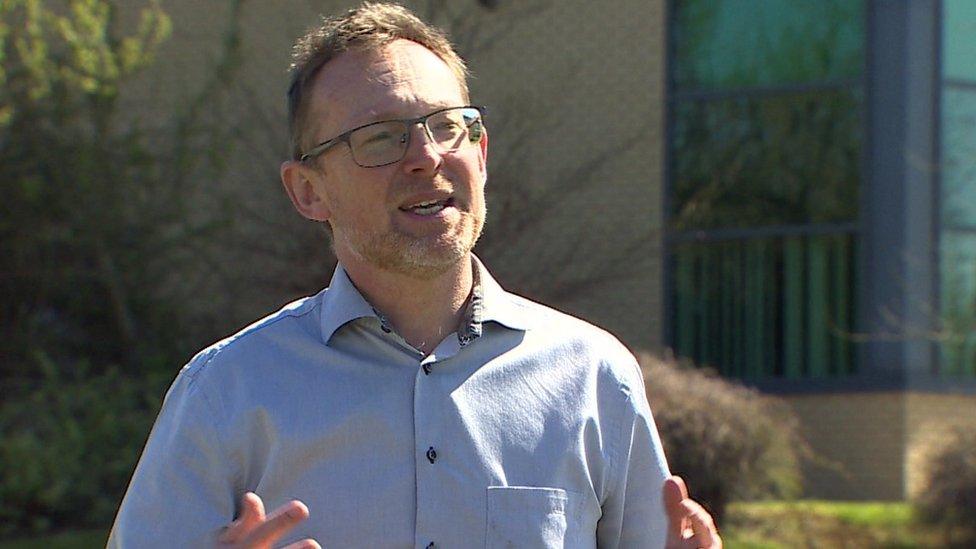
Conservative Russell George says the Welsh government needs to stop blaming UK ministers
The first, on 6 February, will coincide with a walkout by thousands of nurses from the Royal College of Nursing.
The Welsh government said it understood the anger of public sector workers.
"We will continue to work with the NHS, unions and partners to ensure life-saving and life-maintaining care is provided during the industrial action, patient safety is maintained and disruption is minimised," a spokesman said.
Welsh Conservative health spokesman Russell George said the Welsh government needed to stop "blaming UK ministers for failing in its own responsibilities".
"Patients cannot be allowed to suffer with our public services at a standstill and staff cannot be expected to burn out because Labour ministers cannot get their act together," he said.
Plaid Cymru health spokesman Rhun ap Iorwerth said a "substantive" pay rise had to be built into health workers' salaries.
"It's up to government now to avert future strikes by putting a deal on the table that can put the NHS on a firmer foundation for the future," he said.

Do you work for an ambulance service? Are you striking today? Are you a patient affected? Share your experiences by emailing haveyoursay@bbc.co.uk, external.
Please include a contact number if you are willing to speak to a BBC journalist. You can also get in touch in the following ways:
WhatsApp: +44 7756 165803
Tweet: @BBC_HaveYourSay, external
Please read our terms & conditions and privacy policy
If you are reading this page and can't see the form you will need to visit the mobile version of the BBC website to submit your question or comment or you can email us at HaveYourSay@bbc.co.uk, external. Please include your name, age and location with any submission.

BBC WALES INVESTIGATES: The subjects affecting the lives of people in Wales
A CAREER CHANGE WITH A DIFFERENCE: Police new recruits adapt to life on the beat

- Published11 January 2023
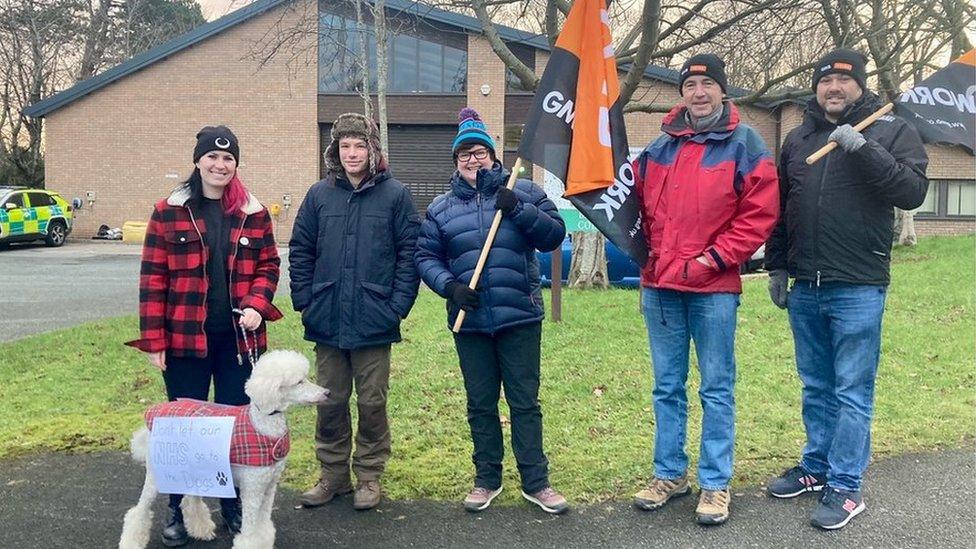
- Published12 January 2023
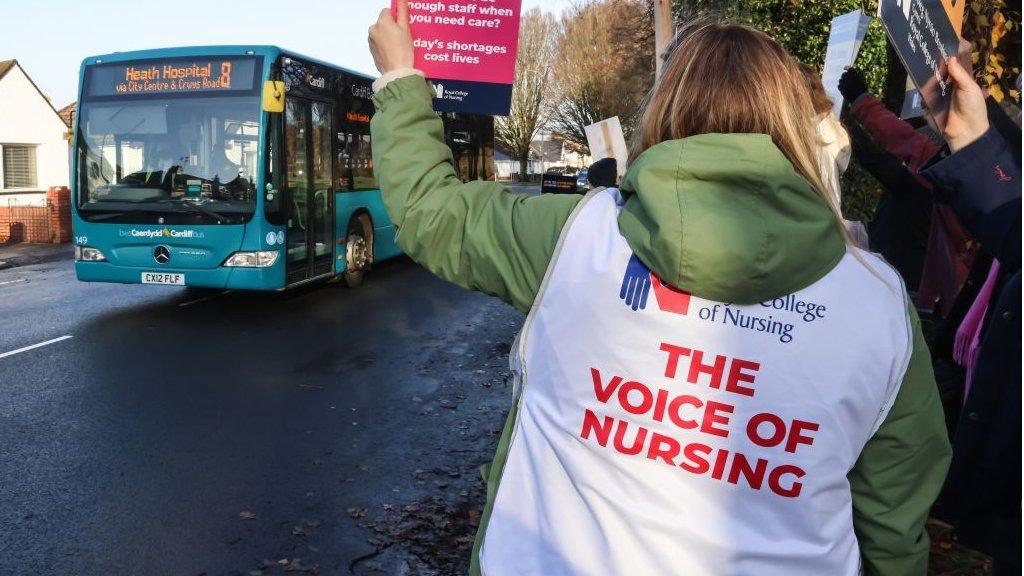
- Published16 January 2023
